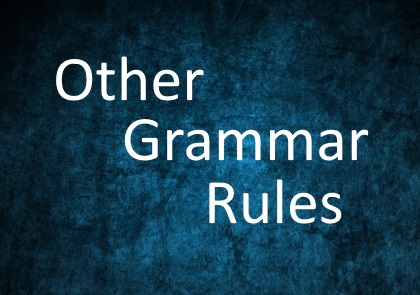This course contains other grammar rules.
When it comes to English speaking skills, you should not pay too much attention to grammar rules at first. However, this does not mean that we should ignore English grammar completely.Needless to say, basic English grammar rules play an important role in learning English, both written and spoken.
Without grammar rules, you can sometimes make yourself understood with short and simple expressions. However, you may fail most of the time with more complicated expressions that require the correct orders or structures of words.As a beginner, you must know basic English grammar rules, as they show you how to arrange vocabulary and make meaningful expressions.
Below is a series of basic English grammar lessons covering some rules which are not covered in the other courses because htye stand alone as simple rules which can't have a whole course.. All the lessons are designed with clear definitions, explanations and forms, followed by lots of examples.
Don’t try to learn by heart all the forms without doing any meaningful training. What you really need to do is take advantage of all the English grammar practice through sample sentences – in other words, you must understand how to use each rule and apply it to your daily speech.
Lessons
-
We use “had better” plus the infinitive without “to” to give advice. Although “had” is the past form of “have”, we use “had better” to give advice about the present or future.
-
This lesson deals with two areas which can cause problems for students: word order with adjectives before a noun, and word order with adverbs after a noun.
-
This lesson provides a simple guideline for choosing between "which" and "that". article provides a simple guideline for choosing between "which" and "that.
-
A language function explains why someone says something. For example, if you are teaching a class you'll have to give instructions. "Giving Instructions" is the language function. Language functions then require certain grammar. To use our example, giving instructions requires the use of the imperative.
-
The infinitive is the base form of a verb. In English, when we talk about the infinitive we are usually referring to the present infinitive, which is the most common.
-
Gerunds function as nouns. Thus, gerunds will be subjects, subject complements, direct objects, indirect objects, and objects of prepositions. Some verbs can be followed by a gerund or by an infinitive. When this is the case, the meaning of the two will be identical for some verbs, but different for others.
-
It can be tricky to remember which verbs are followed by the infinitive (the to form) of the verb and which are followed by the gerund (the ing form) of the verb. Sometimes the use of a gerund or an infinitive can change the meaning of a sentence.
-
Prefixes and suffixes are sets of letters that are added to the beginning or end of another word. They are not words in their own right and cannot stand on their own in a sentence: if they are printed on their own they have a hyphen before or after them.
-
The passive voice is used to show interest in the person or object that experiences an action rather than the person or object that performs the action. In other words, the most important thing or person becomes the subject of the sentence.
-
The expressions 'I wish' and 'If only' are used in English to express wishes and regrets about things that may happen in the future or may have happened in the past.
-
People often get confused about the use of used to + infinitive and be/get used to + ‘ing’ form because they look similar. They are, however, completely different.
-
Too and enough indicate degree. They modify adjectives, adverbs, and nouns. Too is an intensifier that expresses that something is inadequate (below what is desirable) or excessive (above what is desirable)
-
Intensifiers are adverbs or adverbial phrases that strengthen the meaning of other expressions and show emphasis. Words that we commonly use as intensifiers include absolutely, completely, extremely, highly, rather, really, so, too, totally, utterly, very and at all.
-
The genitive case is an English grammatical case that is used for a noun, pronoun, or adjective that modifies another noun. The genitive case is most commonly used to show possession, but it can also show a thing’s source or a characteristic/trait of something.
-
In English grammar, negation is a grammatical construction that contradicts (or negates) all or part of the meaning of a sentence. Also known as a negative construction or standard negation.
-
The words there, their and they're are different and shouldn't be confused. The confusion may occur because the three words are homophones, pronounced in very similar ways.
-
A contraction is a word made by shortening and combining two words. Words like can't (can + not), don't (do + not), and I've (I + have) are all contractions.
-
So, too, either, neither: this is often used as a reply to someone else in a conversation, but both sentences can also be said by the same person, and even joined together.
-
Correlative conjunctions are sort of like tag-team conjunctions. They come in pairs, and you have to use both of them in different places in a sentence to make them work. They get their name from the fact...


